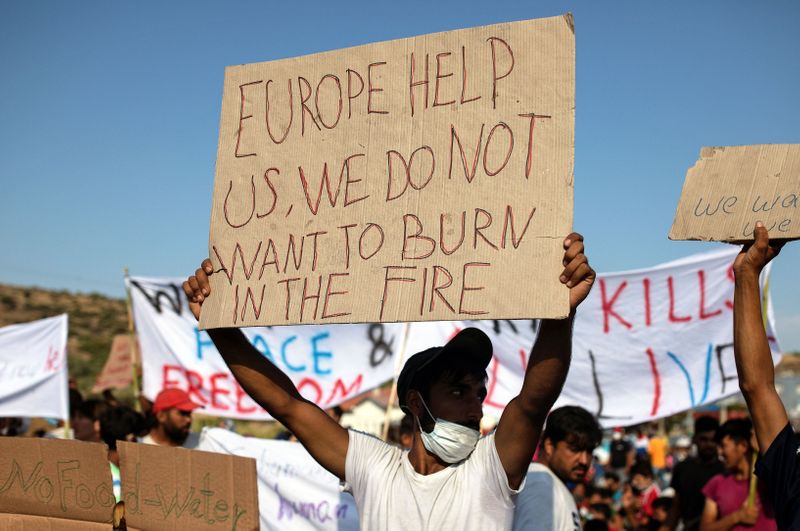By Lefteris Papadimas
LESBOS, Greece (Reuters) - Greek police fired teargas on Saturday during a protest by angry migrants left homeless by a blaze at Europe's largest refugee centre, who demanded to leave the island of Lesbos as authorities started building a new encampment for them.
More than 12,000 people, most from Africa and Afghanistan, have been sleeping rough since flames swept through the notoriously overcrowded Moria camp earlier this week. Some residents had COVID-19, raising fears the outbreak could spread.
Under a hot sun on Saturday, hundreds of migrants, many chanting "Freedom" and "No Camp", gathered as bulldozers cleared ground in preparation for tents to be put up.
Some carried handwritten signs carrying messages including "We don't want to go to a hell like Moria again" and "Can you hear us Mrs Merkel?" in an appeal to the German chancellor.
Police fired rounds of teargas when some of the protesters attempted to march down a road leading to the island's port of Mytilene, which police had blocked while work on the new tent settlement continued nearby.
The confrontation was shortlived.
The fire at the camp, which was holding four times the number of people it was supposed to, has returned the spotlight to the migration crisis facing the European Union, which has struggled to find a response that goes beyond temporary fixes.
Greek authorities have refused any mass transfer off the island, located a few miles off the Turkish coast, despite growing hostility from local residents angry after years of bearing the brunt of the crisis.
But officials said they were determined to provide shelter and proper sanitation and prevent a humanitarian catastrophe.
"As of today, asylum seekers will start coming into the tents, into safe conditions," Migration Minister Notis Mitarachi told reporters at the site.
The need to bring the situation under control has been made more urgent by the fact that authorities have lost track of 35 camp residents who had tested positive for coronavirus.
Health authorities have promised to conduct rapid tests at the entrance of the new camp, with a quarantine unit ready for anyone testing positive.
Still, the unsanitary conditions being endured by Moria's former inhabitants in the fields and streets of Lesbos has caused deep alarm.

"This is a health bomb. These people haven't even had access to water all these days, they cannot even wash their hands," Matina Pagoni, president of Athens and Piraeus hospital doctors' union, told Skai television.